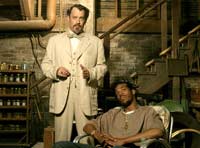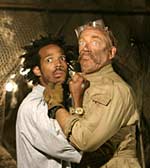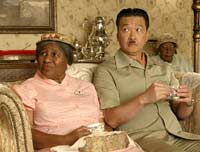 |
This is not the first time moviegoers have seen Tom Hanks secretly tunnel through the earth beneath a stranger’s house. In 1989’s The ‘Burbs, a subversive comedy about eccentric criminals in a friendly suburban neighborhood, he dug his way right into an explosion that rocked the neighborhood. It happens again here, in The Ladykillers—which happens to be a subversive comedy about eccentric criminals in a friendly Bible Belt neighborhood.
But that’s where the resemblances between The Ladykillers and other Tom Hanks comedies stop.

In fact, Hanks’ first outing with the notoriously odd moviemaking team of Joel and Ethan Coen buttons him into a character quite unique in his repertoire—a malevolent villain. Professor G.H. Dorr is a criminal mastermind who dresses as if he has been around since the mid-1800s. He speaks with a stiff Southern accent that renders almost unintelligible his verbose and archaic grandiloquence, a style of speech that suggests he was raised on nothing but Edgar Allen Poe. Dorr fancies himself as sophisticated and highly educated, but at heart he’s as rotten and empty-headed as the rest of the Coen Brothers’ big screen thieves. His method is to organize a team of “experts” who will carry out the hard work of the crime while he rocks back in a chair and quotes poetry or, when things go wrong, mutters things like, “How very irregular.“
Marva Munson (Irma P. Hall), Dorr’s latest target, is a no-nonsense Southern Baptist widow who isn’t about to let the house of her deceased husband be tarnished by tenants who smoke cigarettes—or who listen to that awful “hippity-hop music.” When she’s not knitting and talking to her husband’s rather expressive portrait, she’s down at the local police station reporting complaints about local hooligans. Clearly, Dorr is in for a tough time.
But Dorr has chosen Marva’s house for its proximity to his goal. He deceives her into renting him the empty room upstairs. Once he gains her confidence, he and his team go to work downstairs in the root cellar. She’s convinced that he is rehearsing with an ensemble (“on-SOM-bluh”) of musicians specializing in “music of the rococo.” To pull off this ruse, Dorr masks the sounds of their tunneling efforts with recordings of classical music. While Marva smiles and knits to the reverberations from a boom box below ground, they dig their way to the underground cash vault of a nearby steamboat casino.
Meanwhile, Dorr’s man on the inside (Marlon Wayans), posing as a steamboat janitor, tries not to arouse the suspicion of his disgruntled boss. The chameleonic Steven Root, also appearing unrecognizably in this week’s Kevin Smith film Jersey Girl, fills the role that is present in every Coen Brothers film: the powerful and corrupt authority sitting behind a desk.
It seems like a foolproof plan. But moviegoers know that fools of the Coen Brothers’ variety are the most spectacular fools of all. Remember the escaped convicts robbing a bank in Raising Arizona with a stolen baby in tow? The crooks who made memorable use of a wood chipper in Fargo? Or the fellow who mistook his pistol for an inhaler in Intolerable Cruelty? That must have been what attracted the Coens to do a remake—their first—of this dark, twisted, 1955 British comedy by William Rose. If The Ladykillers is about anything, it is about fools digging their own graves.

As funny as it is, The Ladykillers has an air of desperation about it. The Coens seem to have lost control of their signature qualities. They’re increasingly willing to settle for sophomoric, predictable, and downright crass comedy. The Big Lebowski, O Brother Where Art Thou?, and Intolerable Cruelty went for lowbrow laughs as well, but the characters eventually won our sympathies. Here, the Coens spend each scene straining for laughs with limited success, content merely to exploit the stupidity of their characters to the point of absurdity. The film’s biggest laugh is just a variation on an accidental death that occurred at the end of their last film. Sure, the movie’s a laugh riot, very likely to be a big hit. In fact, it’s funnier than any comedy released so far this year. But the Coens have shown many times that they are capable of something far richer and more memorable.
Part of the problem is that the focus of the film is too much on Dorr, not enough on Marva. The great Alec Guinness played Dorr in the original Ladykillers with a sort of perverse glee. He was a thoughtful over-polite fellow who, when others looked away, betrayed his sinister intent with a ghastly smile. That version of the villain was just creepy enough to make us squirm and laugh in discomfort. Hanks’ Dorr is plenty creepy, but he is more annoying than unsettling. Unlike George Clooney’s wacky divorce lawyer in Intolerable Cruelty, who grew and changed, there is no heart under Hanks’ heavy burden of behaviors. He remains opaque, merely odd, never endearing. Are we supposed to hope for his success? His redemption? His destruction?
It’s not Hanks’ fault. Like Clooney, Nicolas Cage, John Goodman, Frances McDormand, and Billy Bob Thornton before him, he masters his character’s inane dialect and adds another unforgettable performance to the great Coen pantheon. But the Coens fail to find a character in Dorr’s mess of characteristics. Worse, they misgauge our tolerance for his spasmodic laughter and impenetrable verbiage.
Dorr’s four companions fare no better. Each one is a cliché with an added twist, a forced joke with an extra punchline. Gawain MacSam (Wayans) is a gun-happy gangsta with a fixation on ‘booty’ and a mouth that’s fouler than perhaps any Coen character yet. This brand of humor clashes with the Coens’ more sophisticated style, aiming to please baser appetites. It’s juvenile and wearying.
You could call Garth Pancake (J.K. Simmons of Spider-man) “the Dunce of Detonators.” He’s an explosives expert with a rather explosive physical condition that is sure to cause a crisis at the worst possible time. This will get big laughs … from those who think high school locker room humor is funny.
The General (Tzi Ma)—a much more interesting and amusing invention—is a Japanese assassin, a man of few words … especially when he’s trying to hide a burning cigarette in his mouth. The film’s best-choreographed catastrophe occurs when his stealth fails him in the middle of murderous stalking.
Dumbest of them all, Lump (Ryan Hurst) is a world champion of village idiots, a football player who takes orders as the team’s “blunt instrument,” so long as his conscience remains shell-shocked by gridiron collisions.
These losers never achieve the chemistry that characterized the bowling buffoons in The Big Lebowski and the sensitive crooks in Raising Arizona. They’re so ill-equipped for heist work that the movie becomes merely a question of how spectacularly they will fail. Call it Oceans Zero.

Three things make the film worth catching: music, cinematography, and Irma P. Hall.
Hall walks away with the movie. As the well-intentioned but gullible widow, she delivers a heart-and-soul performance that you’ve gotta love. While she’s misguided in her desire to invest all of her assets in Bob Jones University—one of the film’s best running gags—her knack for detecting lies and stopping wrongdoers in their tracks makes her the center of the film.
Her church choir does its part to redeem moviegoers’ time as well, stirring up foot-stompin’, hand-clappin’, hallelujah-shoutin’ soul. From the opening hymn to the closing-credit anthem, these roof-raising hymns and anthems spell out the film’s obvious moral framework. “Go Back to God” is the exhortation in the opening hymn, sung like a dire warning to the cretins invading this church lady’s house. And sure enough, as the thieves ignore the path of righteousness, their sins are found out.
But the most masterful work in the film is the cinematography of Roger Deakins, who has become the most trustworthy member of the Coens’ team. In relocating The Ladykillers from London to the Bible Belt, he finds opportunity to compose some of his finest tableaus. From the polish of the steamboat brass to the murky Mississippi, from Marva’s dank root cellar to the tree-lined streetscapes of the Louisiana neighborhood, Deakins offers imagery worthy of a far better film.
The Coens can probably continue to turn out stylish capers like this for decades. But that sophisticated stride that made their first run of films so remarkable has here degenerated into a sophomoric stumble. There was a time when they took their characters half-seriously. We came away doing more than just quoting them. We cared about them.
Talk About It
Discussion starters- Can you think of true-to-life cases of people stooping to ridiculous behavior to get money? What are you willing to do to earn your “fortune”? Where would you draw the line?
- Marva Munson is clearly not the most educated character in the film. Nor is she the richest or the strongest. What does she have, then, that the people around her don’t have? Why does she prove such an obstacle to the thieves in her home?
- What does the music in the film have to do with the events of the story? Do the lyrics have any relevance to the criminal goings-on?
A ready-to-download, Bible-based discussion guide is available for this movie at ChristianBibleStudies.com. Use this guide after the movie to help you and your small group better connect your faith to pop culture.
The Family Corner
For parents to considerThis film is inappropriate for younger viewers due to frequent profanity, crass comments about male and female anatomy, toilet humor, and a few violent outbursts that can be both cartoonish and bloody. The story is, at its root, a simple morality play. But the plot here seems only an excuse for the filmmakers to indulge in cheap laughs.
Photos © Copyright Touchstone Pictures
What Other Critics Are Saying
compiled by Jeffrey Overstreetfrom Film Forum, 04/01/04The Coen Brothers have made a habit of telling stories about idiotic criminals who learn the wages of sin. The Ladykillers is no exception. It stands out only because a) it is a remake of a 1955 comedy caper, and b) the Coens have stooped to more sophomoric and crass humor than ever before.
Thus, mainstream critics are giving The Ladykillers a cooler reception than they gave last year’s Intolerable Cruelty. Many wonder what happened to the heart and the art that distinguished Fargo, Miller’s Crossing, Barton Fink, and the goofy O Brother, Where Art Thou? Even though The Ladykillers features a funny performance by Tom Hanks and a soundtrack of boisterous gospel music, the lows apparently outweigh the highs.
The Ladykillers concerns a self-declared criminal mastermind known as Professor Dorr (played by Alec Guinness in the original, Hanks here) who pulls together a highly inept team of cons to rob a steamboat casino. They make their move by tunneling from an old woman’s basement into the casino’s cash stash. But then they hit a snag: The old woman is a cantankerous Baptist churchgoer who will not tolerate wrongdoing in her house.
The Coens can probably continue to turn out stylish capers like this for decades. But the sophisticated stride that made their first run of films so remarkable has here degenerated into a sophomoric stumble. There was a time when these quirky filmmakers took their characters half-seriously. We came away doing more than just quoting them. We cared about them.
While The Ladykillers’ foul language is certainly excessive, the film has three distinct virtues that may make it worthwhile for those who can shield themselves from the annoying dialogue: Irma P. Hall’s winning performance as the devout (if naïve) Christian widow, Roger Deakins’ gorgeous cinematography, and the rousing gospel-music soundtrack.
My full review is at Christianity Today Movies.
Michael Elliott (Movie Parables) highlights the film’s moral lessons: “Crime does not pay; actions do have consequences; there is no honor among thieves … But perhaps the most obvious lesson for us can be summed up by a quote that is borrowed from a previous Tom Hanks film … ‘Stupid is as stupid does.'”
Chris Monroe (Christian Spotlight) says it “revels in immoral dealings but nevertheless rounds out with evil-doing being brought to justice.” He calls the movie “well-crafted,” but objects to the “excessive foul language.”
“I can’t remember laughing this much at a film,” says Phil Boatwright (Movie Reporter). “In my opinion, it is the funniest dark comedy since Dr. Strangelove. There is, unfortunately, a fly in the mint julep. Along with the positives … this remake has sadly taken on a modern-day nastiness by incorporating excessive coarse and irreverent language. What a shame.”
Steve Lansingh (The Film Forum) warns moviegoers that the film has little in common with the popular O Brother Where Art Thou? “The Ladykillers is much more akin to the Coens’ Fargo, both disturbingly gruesome tales of bad guys getting their due. The violence is in typical Coen Brothers style—halfway between funny and sickening, which some people don’t seem to mind, but I find difficult to appreciate.”
Steven Isaac (Plugged In) says the foul language is damaging. “I’m left feeling that what I heard while I watched this otherwise masterful movie utterly destroyed its credibility, tore up every layer of its delicate nuance and scribbled haphazardly all over its colorful characterizations.”
David DiCerto (Catholic News Service) calls it “unevenly entertaining. While the film bears the unmistakable stamp of the Coens’ off-kilter humor, it does not rank among their best work. Its deep-South setting is beautifully filmed but its obscenity-laced script may have some viewers singing the blues.”
David Bruce (Hollywood Jesus) says, “It’s the classic battle between good and evil set in a clever and comedic story line.” He also admits, “The language in this film, though true to life as we know it, is enough to curdle milk.”
from Film Forum, 04/08/04Elsewhere, Josh Hurst (The Rebel Base) looks over The Ladykillers, the latest comedy from the Coen Brothers. He finds that it features “one of the finest performances of any Coen flick yet. Irma P. Hall steals the whole doggone movie with her note-perfect portrayal of a kindly but shrewd Southern woman with a soft spot for Bob Jones University and an aversion to ‘hippity hop’ music. But The Ladykillers also differs from your average Coen Brothers film in a few key areas. Like the fact that it’s a remake. Whenever a celebrated classic film is remade one always has to wonder exactly why Hollywood found it necessary to make the same movie all over again. And then there’s the characters. Or maybe I should say the lack of characters.” He is also displeased to find the Coens have settling for “cheap, easy, sometimes-bawdy laughs.”
Related Elsewhere:
A ready-to-download Movie Discussion Guide related to this movie is available at ChristianityTodayMoviesStore.com. Use this guide after the movie to help you and your small group better connect your faith to pop culture.
Copyright © 2004 Christianity Today. Click for reprint information.











